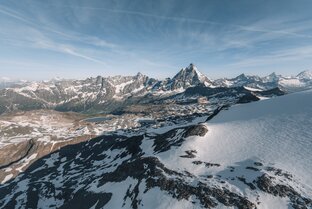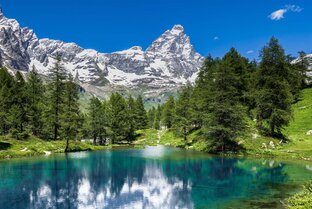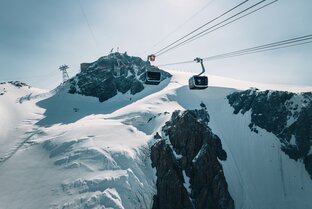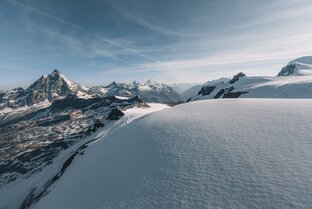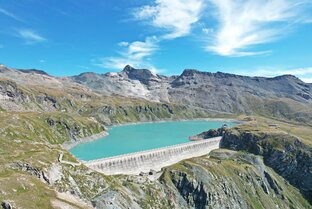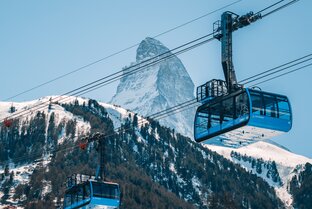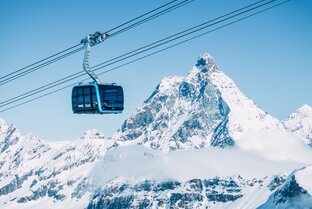

28.05.2020
The vision of an alpine crossing takes shape
For the armies of Hannibal and Napoleon, crossing the Alps was a trailblazing endeavour. Later, their lead was followed by the aviation pioneer Geo Chavez, who became the first person to fly over the Alps. And the pioneering spirit is alive and well today in Zermatt: with Project Matterhorn Alpine Crossing, Zermatt Bergbahnen has laid the foundation stone for the highest cableway crossing of the Alps, running between Zermatt in Switzerland and Cervinia in Italy.
The first connection between Breuil-Cervinia and Zermatt was created in 1939 with the opening of the cable car from Plan Maison to Plateau Rosa. From there, winter sports enthusiasts coming from Italy could reach the slopes on the Zermatt side of the border. In the decades that followed, several cableways were also built on the Swiss side, culminating in the completion of the link between Zermatt and the Klein Matterhorn in 1979. The next milestone was achieved two years ago when the Matterhorn Glacier Ride I opened to the public. Now, as construction work scheduled for the next two summers gets under way on the Matterhorn Glacier Ride II, a structurally similar 3S cableway between Testa Grigia and the Klein Matterhorn, the final remaining gap between Zermatt and Breuil-Cervinia is set to be closed. When the Matterhorn Glacier Ride II opens in readiness for the 2021/22 winter season, the highest crossing of the Alps by cableway will become a reality.
Zermatt Bergbahnen AG has not been immune to the effects of the lockdown, which has caused uncertainty across the entire tourist industry. However, rather than falling into a state of paralysis, Zermatt Bergbahnen AG has been setting its sights on life after the pandemic. The initial position may be more difficult but thanks to its sound financial situation ZBAG is going ahead with its major investments as planned and will continue with the construction of the Matterhorn Glacier Ride II, with an estimated budget of 35 million Swiss francs. Due to the quick installation of safety measures at the construction sites, work could already start again this spring, albeit on a reduced scale.
According to Franz Julen, Chairman of the Board of ZBAG: “The Matterhorn Glacier Ride II and with it the Matterhorn Alpine Crossing, the all-year connection between Zermatt and Italy, will present ZBAG, the Zermatt-Matterhorn resort and the Valle d’Aosta with many opportunities and provide a boost for the tourist sector both in the winter and especially the summer. For many years, Zermatt has stood for pioneering spirit, entrepreneurship, a belief in tourism and in the future, but also for respect and humility in the face of nature. The Matterhorn Glacier Rides I and II, along with the associated infrastructure and services on the Klein Matterhorn, will form the next chapter in Zermatt’s success story.”
Custom technology the key to success
The installation of a 3S cableway in a location where space is severely restricted and at altitudes of over 3800 metres above sea level not only requires the highest levels of precision from the construction workers but also presents the cableway engineers at LEITNER ropeways with huge challenges. For example, the construction of the Matterhorn Glacier Ride II requires a custom solution specially built to cope with the difficult conditions. Thanks to the increased wind stability of the 3S system, it is possible to construct the 1.7 kilometre span between the two stations entirely without the need for supporting towers.
Other technical innovations will be evident in the mountain station. Drive power will be provided by two high-performance DirectDrive synchronous motors working independently of each other. Leitner’s DirectDrive system operates without gears and connects directly to the pulley wheel, reducing maintenance, wear and energy consumption to a minimum. In combination with the use of supplementary emergency and rescue drive systems, this redundant system ensures that in the event of an emergency passengers can always be brought back to the stations. The lift has four separate drive types which can all be powered independently of each other via the electricity supply network or an emergency power supply.
Because of the limitations on space on the mountain, a shorter than usual drive station is being built. The station will allow cabins to enter and leave with a cable speed of 5 metres per second. The cabins can be braked or accelerated before they reach the station. The shorter drive station means that the energy requirement in the mountain station can be reduced.
The third new feature in the mountain station will be a system of rails that make it possible for the cabins to be swapped between the two sections, so the cabins from the MGR II section can be mounted onto the MGR I cable and brought to the big station hall at Trockener Steg for inspection there. The capacity to keep all the cabins from both sections at Trockener Steg and garage the ten cabins from the Matterhorn Glacier Ride II in the loop of both systems will save a great deal of space in the station buildings.
Individuality in all things
In terms of design and finishing, LEITNER ropeways is satisfying Zermatt Bergbahnen AG’s every wish. For example, passengers will have the pleasure of travelling in cabins designed by Pininfarina, sitting on heated leather seats and enjoying the views of the surrounding alpine landscape through panoramic windows. Anyone in search of luxury and excitement can book into one of the Crystal Ride cabins for the section between Testa Grigia and the Klein Matterhorn. The journey will be an experience to remember, thanks to the glittering Swarovski crystals and a glass floor that reveals views of the glacier below.
To give an idea of the Matterhorn Alpine Crossing vision, LEITNER ropeways and Zermatt Bergbahnen AG have jointly produced a video of the project. For the film, photogrammetric measurements of the Klein Matterhorn and Testa Grigia were carried out using a drone. The impressive video was edited together from a mixture of drone images, 360° video recordings of the route of the cableway and 3D animations. It was only possible to overcome the challenge of filming at this altitude thanks to the expertise of our partners at LEITNER ropeways. The results speak for themselves and can be viewed at matterhornparadise.ch/en/AlpineX. Immerse yourself in the Matterhorn Alpine Crossing – or rather, take off and enjoy the flight over the Alps.
Matterhorn Glacier Ride II: technical details
| HEIGHT VALLEY STATION | SPEED |
| 3'458 m above sea level | 7.5 m/sec |
| HEIGHT MOUNTAIN STATION | JOURNEY TIME |
| 3’821 m above sea level | 4 min |
| CABLE CAR MANUFACTURER | NUMBER OF CABINS |
| LEITNER ropeways | 10 |
| CABLE CAR LENGTH | PASSENGERS PER CABIN |
| 1.7 km | 28 |
| ELEVATION DIFFERENCE | DRIVE SYSTEM |
| 362 m | LEITNER DirectDrive |
| CARRYING CAPACITY | CABIN DESIGN |
| 1’300 passengers per hour | Pininfarina |





